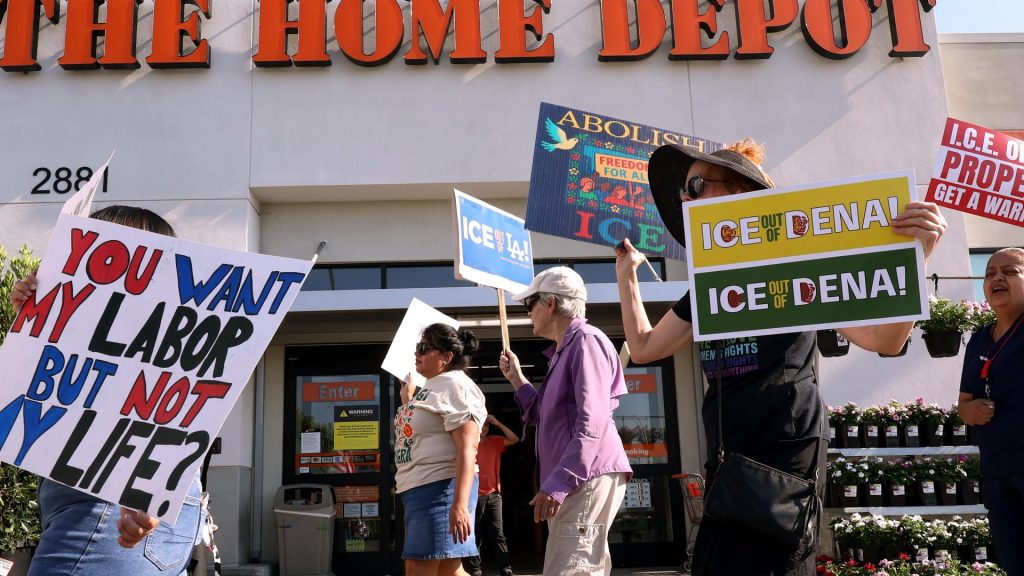Supreme Court stay hands ICE more leeway for immigration stops in LA

The Supreme Court on Monday temporarily paused a lower court ruling by a federal judge that restricted federal immigration officers from making certain stops in Los Angeles and surrounding counties. The pause gives the Trump administration the ability to conduct roving immigration stops in its push to detain more people in the country without authorization.
Plaintiffs argued the stops were based on racial profiling, claiming they violate the Fourth Amendment, which protects against unreasonable searches and seizures, because officers are targeting individuals based on broad characteristics rather than specific evidence of “illegal presence” in the country.
The Supreme Court’s decision temporarily lifts the lower court’s restrictions, allowing ICE to continue certain stops while the case moves through the courts, without ruling on the agency’s authority overall.
Origins of the case: day-laborer raids
The concerns arose from raids at day laborer sites, locations where workers often gather to find jobs, such as Home Depot parking lots, car washes and bus stops. The raids in question were part of large-scale operations targeting hundreds of individuals in the Los Angeles area, drawing national attention to the methods and criteria used by federal immigration officers.
In July, a federal judge in California blocked ICE from making stops based solely on race, language or type of work, after plaintiffs argued officers were targeting individuals based on ethnicity rather than evidence of illegal presence. The government appealed, arguing the limits would cripple enforcement in areas with large undocumented populations.
The government argued that some plaintiffs may not have a legal right to challenge the stops because they cannot prove they will be targeted again.
Officials respond to the ruling
Homeland Security Secretary Kristi Noem, named in the case, said the Supreme Court’s decision allows immigration officials in Los Angeles to continue targeting “the worst criminal illegal aliens that pose a danger to public safety.”
Department of Homeland Security spokesperson Tricia McLaughlin called the ruling a victory for both California and the rule of law. She said in a post on X, “Law enforcement will not be slowed down and will continue to arrest and remove the murderers, rapists, gang members and other criminal illegal aliens that Karen Bass continues to give safe harbor.”
McLaughlin said DHS carries out federal immigration law without the use of prejudice, favor or fear tactics.
Plaintiff shares personal experience
Pedro Vasquez Perdomo, one of the named plaintiffs, said he joined the case because of his personal encounters with ICE agents.
“When ICE grabbed me, they never showed a warrant or explained why. I was treated like I didn’t matter–locked up, cold, hungry, and without a lawyer. Now, the Supreme Court says that’s okay? That’s not justice. That’s racism with a badge,” he said regarding the decision.
Supreme Court justices split on decision
Six justices voted to lift the federal judge’s order but did not explain their decision, while three justices dissented. In a concurring opinion, Justice Brett Kavanaugh said the government had a strong chance of winning on appeal and that keeping the block in place could cause irreparable harm.
“Apparent ethnicity alone cannot furnish reasonable suspicion,” Kavanaugh wrote. “Under this Court’s case law regarding immigration stops, however, it can be a relevant factor.”
Kavanaugh also explained that agents may consider multiple factors together, such as location, type of work or language skills, when determining if there is reasonable suspicion of unlawful presence.
Justice Sonia Sotomayor, joined by Justices Elena Kagan and Ketanji Brown Jackson, dissented, saying the raids targeted people based only on broad profiles. She criticized the majority for using the emergency docket to allow what she called unconstitutional mass arrests that left Latino communities living in fear.
“The Fourth Amendment thus prohibits exactly what the Government is attempting to do here: seize individuals based solely on a set of facts that “describe[s] a very large category of presumably innocent” people,” she wrote.
Future court proceedings to continue
The American Civil Liberties Union of Southern California said the case will continue, noting that the Supreme Court’s decision does not halt future proceedings. Later this month, a federal judge is scheduled to hear arguments and decide whether a longer-term injunction is needed to limit how the government conducts immigration raids.
“This decision is a devastating setback for our plaintiffs and communities who, for months, have been subjected to immigration stops because of the color of their skin, occupation, or the language they speak,” said Mohammad Tajsar, a senior attorney with the ACLU Foundation of Southern California.
The post Supreme Court stay hands ICE more leeway for immigration stops in LA appeared first on Straight Arrow News.





